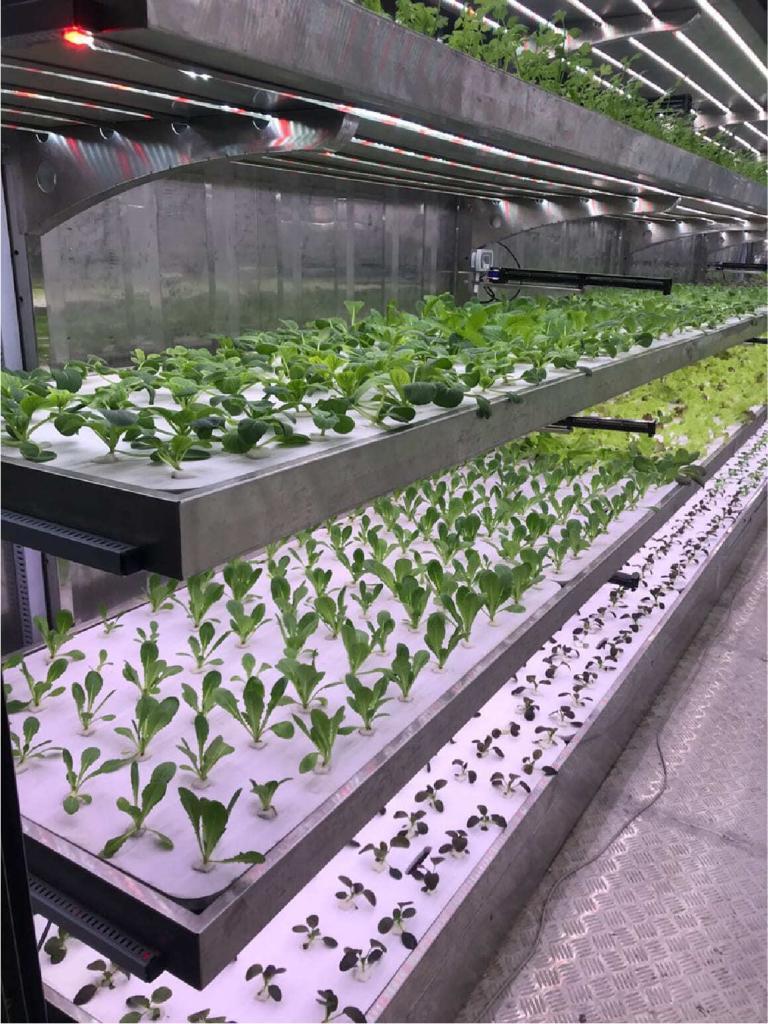What is a phytotron and how does it work?
A phytotron is a high-tech piece of equipment designed to accurately replicate controlled environmental conditions necessary for growing plants. Equipped with advanced systems for regulating temperature, humidity, lighting and carbon dioxide levels, it can simulate everything from tropical climates to arctic conditions.
Phytotron control systems include:
- Temperature control: Adjustable range from -10°C to 60°C, with controlled variations in gradients.
- Humidity management: Regulation between 10% and 98% relative humidity, essential for water stress studies.
- Advanced lighting: Use of LED technology adjustable in intensity and specific spectra (PAR, UV, IR) to maximise photosynthesis.
- CO₂ regulated: Systems that allow enrichment or reduction of carbon dioxide concentration, simulating different atmospheric scenarios.
What solutions does TestingLab offer for crop monitoring?
TestingLab has climatic, growth and cultivation chambers that meet the most advanced specifications for phytotron-like applications.
Climatic chambers with multivariable control:
- Capable of maintaining an extreme temperature range (-40°C to +85°C) with ±0.1°C accuracy.
- Customised LED lighting to simulate specific spectra (UV, PAR, IR) according to plant needs.
- CO₂ regulation to replicate precise atmospheric conditions, from low levels to high enrichments.
- Ideal for climate stress studies, environmental simulations and crop resistance tests.
Plant growth chambers:
- Equipped with dynamic lighting systems that adjust light intensity and spectra according to the life cycle of the plants.
- Advanced relative humidity control (10%-98%) to simulate specific microclimates.
- Designed for photosynthesis research, plant phenology and prolonged crop trials.
Germination chambers:
- Create ideal conditions for testing seed viability and performance in different environmental scenarios.
- They incorporate precisely adjustable humidity and temperature control systems to ensure replicable results.
- Key applications in seed quality studies and breeding programmes.

Key benefits of choosing TestingLab
- Customisation: Equipment tailored to the specific needs of each client, with customised configurations to meet the technical requirements of each project.
- Energy efficiency: Use of sustainable technologies, such as energy-efficient LED lighting and thermal optimisation systems, which reduce operating costs and environmental impact.
- Accurate results: Absolute control of environmental conditions, guaranteeing reproducibility in scientific experiments and reliability in the data obtained.
- Compatibility with analysis tools: The cameras include advanced software to monitor environmental variables, record data in real time and generate automated reports, facilitating analysis and traceability.
- Specialised technical support: TestingLab provides expert advice on the installation, configuration and maintenance of the equipment, ensuring optimal performance and quick solutions to any incident.
EGCS | Our climatic culture chamber with FITOTRON technology.
Designed for the study of growth and cultivation of long plants, short plants, tissue cultures, cell cultures, seeds and entomology in the laboratory with humidity control and LED lighting. With horizontal or vertical air flow. With LED lighting with photoperiod regulation. Find out more and request a quote here.

Main uses: Why are phytotrons indispensable in research?
Phytotrons are essential tools in many sectors due to their ability to replicate precise and controlled environmental conditions. This makes them essential allies for scientific research and the development of innovative solutions in various fields.
Agronomy and biotechnology
- Evaluation of pest- or drought-resistant crops:
Phytotrons allow the recreation of controlled environments to simulate abiotic stress (drought, salinity, extreme temperatures) or biotic stress (pest and disease attacks). These tests help to identify resistance genes in plants and to develop more robust varieties. - Development of new plant varieties with higher yields or adaptability:
Through phytotron studies, complete growing cycles under optimal or extreme conditions can be analysed, allowing scientists to select varieties that produce more biomass, higher quality fruit or are more resistant to climatic variations. - Tissue culture and micropropagation:
Phytotrons provide the ideal conditions of light, humidity and temperature for micropropagation of plants, a key technique for mass production of commercial crops and conservation of endangered species.
Climate studies
- Analysing the impact of climate change on plant development:
By simulating projected conditions of increased temperature, changes in precipitation patterns or elevated CO₂ levels, researchers can study how plants will react to future scenarios, assessing changes in their growth, flowering, reproduction and carbon uptake. - Simulation of extreme events such as heat waves or cold spells:
Phytotrons make it possible to study the tolerance of plants to extreme events such as late frosts, extreme heat or rapid temperature fluctuations. This data is essential for predicting agricultural productivity in a changing climate. - Ecological research:
Phytotrons are also used to analyse interactions between plant species and their environment, such as competition for resources or response to invasions by alien species.
Food industry
- Crop trials under controlled conditions to optimise agricultural production:
Phytotrons make it possible to analyse how different combinations of nutrients, lighting and temperature influence the quality and quantity of commercial crops such as cereals, fruits and vegetables. - Study the nutritional content and quality of produce:
In controlled growth chambers, researchers can study how environmental changes affect the nutritional composition of foods, including the content of vitamins, antioxidants and other bioactive compounds. - Post-harvest storage tests:
By simulating storage conditions, phytotrons help assess the durability and stability of agricultural products, improving preservation strategies.
Quality control
- Validation of agrochemicals and fertilisers under reproducible conditions:
Phytotrons allow the efficacy and safety of products such as herbicides, fungicides and biofertilisers to be tested under controlled conditions, ensuring replicable results that meet international standards. - Development of standardised protocols for specific crops:
Manufacturers of seeds, fertilisers and other agricultural inputs can use phytotrons to establish specific management guidelines to maximise product performance in different climates and regions. - Accelerated stress testing:
By simulating extreme environmental conditions, phytotrons help validate the stability and viability of seeds and other biological materials over time, reducing traditional testing cycles and accelerating the development of new products.

